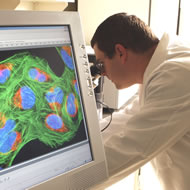
Environmental Factor, September 2008, National Institute of Environmental Health Sciences
Alcohol Binges Early in Pregnancy Increase Risk of Infant Oral Clefts
By Robin Mackar
September 2008


A new study by NIEHS epidemiologists shows that pregnant women who binge drink early in their pregnancy increase the likelihood that their babies will be born with oral clefts. Thestudy(http://www.ncbi.nlm.nih.gov/pubmed/18667525?ordinalpos=1&itool=EntrezSystem2.PEntrez.Pubmed.Pubmed_ResultsPanel.Pubmed_RVDocSum)![]() appeared online July 30 in theAmerican Journal of Epidemiology.
appeared online July 30 in theAmerican Journal of Epidemiology.
The researchers found that women who consumed an average of five or more drinks per sitting were more than twice as likely than non-drinkers to have an infant with either of the two major infant oral clefts — cleft lip with or without cleft palate or cleft palate alone. Women who drank at this level on three or more occasions during the first trimester were three times as likely to have infants born with oral clefts.
"These findings reinforce the fact that women should not drink alcohol during pregnancy," said Lisa A. DeRoo, Ph.D., a staff scientist in the NIEHS Chronic Disease Epidemiology Group and author on the study. "Prenatal exposure to alcohol, especially excessive amounts at one time, can adversely affect the fetus and may increase the risk of infant clefts." The causes of clefts are largely unknown, but both genetic predisposition and environmental factors are believed to play a role in their development.
The population-based study was conducted in Norway, which has one of the highest rates of oral clefts in Europe. The investigators contacted all families of newborn infants born with clefts between 1996 and 2002. The study included 573 mothers who had babies born with cleft lip with or without cleft palate and cleft palate only, as well as 763 mothers randomly selected from all live births in Norway. The average age of the mostly married mothers was 29 years.
Mothers completed a self-administered mailed questionnaire focused heavily on the mother’s lifestyle and environmental exposures during her first three months of pregnancy when a baby’s facial development takes place.
The researchers found increased risks of orofacial clefts among infants whose mothers reported binge-level drinking of an average of five or more drinks per occasion during the first trimester compared to non-drinkers. Risk was further increased among women who drank at this level most frequently.
Both animal and human data suggest that it is the dose of alcohol consumed at one time during pregnancy rather than the frequency or total amount over time that matters most. "The greater the blood alcohol concentration, the longer the fetus is exposed. A single binge during a critical period of an infant’s development can be harmful," DeRoo emphasized.
"Fortunately, heavy maternal drinking is uncommon in many populations, but the fact that it is happening at all tells us we need to do a better job of letting mothers know about the effects that alcohol can have on their baby’s development," explained Allen J. Wilcox, M.D., Ph.D., principal investigator in the NIEHS Environmental Toxins and Human Reproduction Group and co-author on the paper. In Norway, a separate study found that 25 percent of Norwegian women reported at least one binge-drinking episode during early pregnancy.
Alcohol is a recognized teratogen, an environmental agent that can cause malformations of an embryo or fetus. One of the most severe outcomes of heavy maternal drinking is fetal alcohol syndrome, a lifelong condition that causes physical and mental disabilities, including craniofacial malformations. There has been little research to determine if alcohol consumption is related to oral cleft risk.
The research was supported by the Intramural Research Program of the NIH, NIEHS. Researchers at the University of Bergen, the University of Oslo and the Medical Birth Registry of Norway also contributed to this study.
Citation: DeRoo LA, Wilcox AJ, Drevon CA, Lie RT. 2008. First-trimester maternal alcohol consumption and the risk of infant oral clefts in Norway: a population-based case-control study. Am J Epidemiol Epub ahead of print July 30, 2008, doi: 10.1093/aje/kwn186.
(Robin Mackar is News Director in the NIEHS Office of Communications and Public Liaison and a regular contributor to the Environmental Factor.)
"Modifying Risk Factors..." - previous story ![]()
![]() next story - "Gene Expression in..."
next story - "Gene Expression in..."
September 2008 Cover Page



